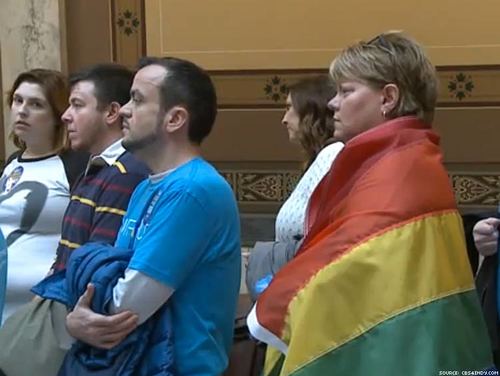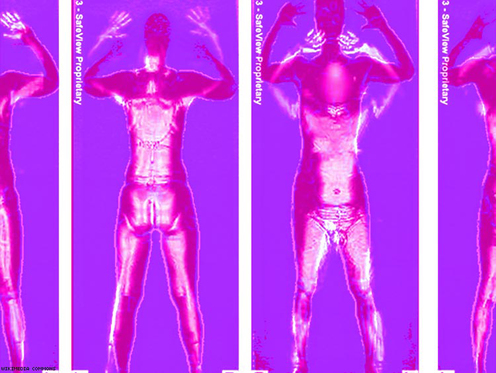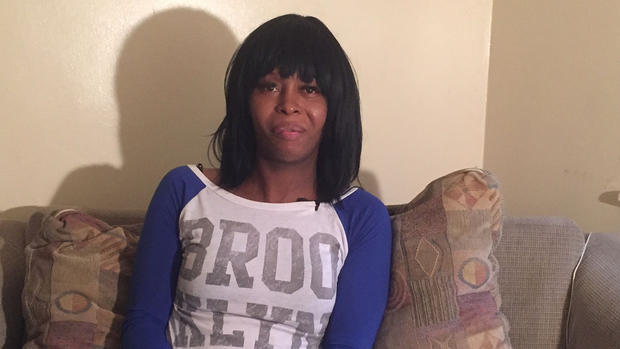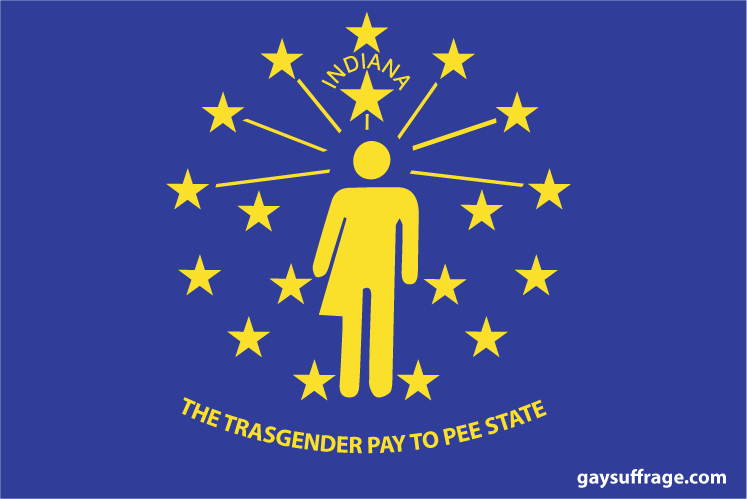Transgender Terms: Breaking Down Definitions and Dos & Don'ts
Guard Charged With Assault After Confronting Transgender Woman Using Women's Restroom, Police Say
By Jackie Bensen
D.C. police have charged a security guard at a Giant grocery store with simple assault after a transgender woman said the guard forced her out of the women's restroom.
Ebony Belcher, 32, said she went to the Giant in northeast D.C. with a friend to pick up a delivery from the Western Union.While at the Giant, she asked a store employee to point her to the restroom and passed a female security officer standing in the hallway.
The officer came into the restroom and told her to get out, according to Belcher."She opened the door and came in and started calling me derogatory names," Belcher said.
She said the officer put her hand on her shoulder and arm, grabbed her and pushed her out of the store.
Belcher said the guard told her, "You guys cannot keep coming in here and using our women's restroom. They did not pass the law yet."
She said she called police and reported the incident after she left the store. According to a police report, officers arrested the guard at the Giant after the confrontation.
Security Guard Arrested After Bathroom ConfrontationD.C. Police arrested a security guard at a Giant in Northeast Wednesday. Sources tell News4 the guard is accused of assaulting a transgender woman who wanted to use the women's restroom. News4's Jackie Bensen reports. (Published Wednesday, May 18, 2016)
Belcher said she suffers from Parkinson's disease and almost fell while the officer was shoving her.
The guard, who has not been identified, is a special police officer at a Giant store near Third and H streets in northeast D.C.
Giant issued a statement, which read: "As this matter involves a third party that provides security services for Giant and there's an ongoing criminal investigation, all inquiries related to the incident at the H Street Giant should be directed to the local police for a comment at this time."
President Obama recently issued a directive to public schools that transgender students must be allowed to use the bathroom of their choice.
A controversial law in North Carolina has also brought the issue to the forefront. The law says transgender people must use public bathrooms, showers and changing rooms that correspond to the sex on their birth certificate. The Justice Department has sued North Carolina, saying the law violates civil rights laws.
Ebony Belcher, 32, said she went to the Giant in northeast D.C. with a friend to pick up a delivery from the Western Union.While at the Giant, she asked a store employee to point her to the restroom and passed a female security officer standing in the hallway.
The officer came into the restroom and told her to get out, according to Belcher."She opened the door and came in and started calling me derogatory names," Belcher said.
She said the officer put her hand on her shoulder and arm, grabbed her and pushed her out of the store.
Belcher said the guard told her, "You guys cannot keep coming in here and using our women's restroom. They did not pass the law yet."
She said she called police and reported the incident after she left the store. According to a police report, officers arrested the guard at the Giant after the confrontation.
Security Guard Arrested After Bathroom ConfrontationD.C. Police arrested a security guard at a Giant in Northeast Wednesday. Sources tell News4 the guard is accused of assaulting a transgender woman who wanted to use the women's restroom. News4's Jackie Bensen reports. (Published Wednesday, May 18, 2016)
Belcher said she suffers from Parkinson's disease and almost fell while the officer was shoving her.
The guard, who has not been identified, is a special police officer at a Giant store near Third and H streets in northeast D.C.
Giant issued a statement, which read: "As this matter involves a third party that provides security services for Giant and there's an ongoing criminal investigation, all inquiries related to the incident at the H Street Giant should be directed to the local police for a comment at this time."
President Obama recently issued a directive to public schools that transgender students must be allowed to use the bathroom of their choice.
A controversial law in North Carolina has also brought the issue to the forefront. The law says transgender people must use public bathrooms, showers and changing rooms that correspond to the sex on their birth certificate. The Justice Department has sued North Carolina, saying the law violates civil rights laws.
Nebraska senators tread warily with gay, transgender issues |
|
Associated Press
LINCOLN, Neb. (AP) — By rejecting bills this session on either side of gay and transgender issues, Nebraska lawmakers acknowledged that while they're willing to take stands on some social issues, they're hesitant to take up matters dealing with gay and transgender rights.
On Friday, Sen. Mark Kolterman of Seward pulled a bill that would protect state funding for faith-based child placement agencies that refuse to work with gay, lesbian, bisexual and transgender foster parents. Last week the Legislature rejected a bill that would have provided workplace protections for gay and transgender employees.
LINCOLN, Neb. (AP) — By rejecting bills this session on either side of gay and transgender issues, Nebraska lawmakers acknowledged that while they're willing to take stands on some social issues, they're hesitant to take up matters dealing with gay and transgender rights.
On Friday, Sen. Mark Kolterman of Seward pulled a bill that would protect state funding for faith-based child placement agencies that refuse to work with gay, lesbian, bisexual and transgender foster parents. Last week the Legislature rejected a bill that would have provided workplace protections for gay and transgender employees.
"Pay to Pee" wasn't bad enough, New Indiana Bill Would Keep Anti-Trans Discrimination Legal
 A Republican state lawmaker's solution to settle a controversy over LGBT protections: Eliminate gender identity.
A Republican state lawmaker's solution to settle a controversy over LGBT protections: Eliminate gender identity.
Lawmakers in Indiana are feeling the heat from business leaders, voters, and the local media about enacting protections against anti-LGBT discrimination in the wake of last year’s religious freedom act debacle. But a Republican state senator wants to keep anti-transgender discrimination legal, while GOP House leaders are declaring LGBT protections are not even on their priority list for the 2016 session.
Sen. Travis Holdman filed a new bill Thursday, Senate Bill 334, which would ban discrimination based on sexual orientation but not gender identity, effectively taking the T out of LGBT protections, reports the The Indianapolis Star.
Holdman told Indianapolis TV station WXIN that other lawmakers and constituents had expressed concerns over the inclusion of gender identity in proposed legislation. He said transgender protections should be kept out of the bill and studied further at a summer committee. It would not override existing municipal ordinances but would prevent cities and counties from enacting new protections for trans people.
LGBT activists were quick to object. "This bill is a non-starter that offers zero protections for transgender people in Indiana. Freedom Indiana cannot and will not support that. We are for full protections for all LGBT people,” said Chris Paulsen of Freedom Indiana in an emailed statement. “Transgender Hoosiers are everyday Hoosiers. And we don’t study people. Study committees are for roads, bridges, things like that, and we don’t study people.”
Also Thursday, Republican House Speaker Brian Bosma unveiled his party’s legislative agenda for 2016. It includes a push for infrastructure improvements, a scholarship to attract candidates for teaching jobs, and drug trafficking legislation.
Protections for LGBT Hoosiers didn’t make the list.
“I just don’t think it was a priority for legislative leaders,” Bosma told WIXN. “I think there was some discussion about it. We have life-or-death situations on the board behind me right now.”
Sen. Travis Holdman filed a new bill Thursday, Senate Bill 334, which would ban discrimination based on sexual orientation but not gender identity, effectively taking the T out of LGBT protections, reports the The Indianapolis Star.
Holdman told Indianapolis TV station WXIN that other lawmakers and constituents had expressed concerns over the inclusion of gender identity in proposed legislation. He said transgender protections should be kept out of the bill and studied further at a summer committee. It would not override existing municipal ordinances but would prevent cities and counties from enacting new protections for trans people.
LGBT activists were quick to object. "This bill is a non-starter that offers zero protections for transgender people in Indiana. Freedom Indiana cannot and will not support that. We are for full protections for all LGBT people,” said Chris Paulsen of Freedom Indiana in an emailed statement. “Transgender Hoosiers are everyday Hoosiers. And we don’t study people. Study committees are for roads, bridges, things like that, and we don’t study people.”
Also Thursday, Republican House Speaker Brian Bosma unveiled his party’s legislative agenda for 2016. It includes a push for infrastructure improvements, a scholarship to attract candidates for teaching jobs, and drug trafficking legislation.
Protections for LGBT Hoosiers didn’t make the list.
“I just don’t think it was a priority for legislative leaders,” Bosma told WIXN. “I think there was some discussion about it. We have life-or-death situations on the board behind me right now.”
Goodbye, 'Anomaly' — TSA's New Word for Trans Bodies Is 'Alarm'

BY DAWN ENNIS
DECEMBER 24, 2015 2:37 PM EST
On the eve of the Christmas getaway, the Transportation Security Administration tells The Advocate it has chosen a new word for its airport screening agents to use whenever their imaging machines encounter a transgender traveler whose anatomy does’t match the standard binary.
The TSA reveals the new word is “alarm,” and it now appears on the TSA’s website. A spokesperson says it is already in use by agents at all U.S. airports.
ADVERTISING“TSA has implemented this change in terminology and we have communicated it through various methods to the frontline workforce.”
Until recently the TSA used the term “anomaly,” which would require agents more closely examine the passenger as a potential security risk. That’s what happened to TV comedy producer and trans woman Shadi Petosky of Los Angeles in September when she was live-tweeted her experience.
The TSA’s website explains that when agents encounter an “alarm” or, in other words, a discrepancy that requires additional screening, they’ll follow the same procedures as before:
“If there is an alarm, TSA officers are trained to clear the alarm, not the individual. Additional screening is conducted to determine whether a prohibited item is present.”
In Petosky's case, that “item” was her penis.
The month after Petosky’s incident, TSA national spokesman Mike England and Kimberly Walton, assistant administrator of TSA's Office for Civil Rights and Liberty, revealed the agency had decided to replace the word “anomaly.”
But the TSA didn’t yet have new terminology in place, and officials told The Advocate they were working with trans advocates and the broader community to find a solution. When The Advocate contacted those groups named by the TSA, some indicated they had never been contacted by the TSA in this effort.
The spokesperson today confirmed, “TSA guidance from TSA Headquarters provides that TSA officers may no longer use the term ‘anomaly.’ As with any institutional change, while the new term has been launched, it will take time for the change to fully socialize.”
“We thank the public for their patience as the message filters through to all personnel nationwide,” the spokesperson continued, “and as personnel become accustomed to different terminology.”
Although the wording has changed, the TSA’s updated website has not changed the process for screening transgender travelers whose bodies don’t match what the imaging machines are programmed to accept as “male” and “female.”
“You may also undergo a pat-down procedure if you alarm the screening equipment and/or at random,” says the site.
However, a recent update to TSA screening protocols eliminated the option for some travelers to "opt-out" of the body scanners in favor of a pat-down, mandating all passengers, except those with disabilities, medical conditions, or other special needs, enter the full-body scanner. The TSA maintains that this shift in policy is a minor one that takes into account additional security concerns, and that "the vast majority of passengers will not be affected."
All travelers who are screened through the imaging machines are still eyeballed by a TSA agent who judges whether they appear to be male or female; they press a button, and on a screen, a blue icon lights up for men, pink for women. When asked what the TSA’s recommendation is for intersex and gender-nonconforming individuals, the spokesman said, “We decline to comment on the specifics of any individual passenger’s screening experience.”
In October, Walton explained the process this way:
“The technology that we deploy, the best technology for the current and historical threat, does require the transportation security officer to either identify the person as a male or female. And that technology, it does depend on human anatomy. And so in a situation where a transgender traveler is coming through the checkpoint, that decision is made based on the way the individual presents.”
This is important because any individual who doesn’t fit the binary, as programmed, sets off the “alarm” and will require additional screening.
The TSA is adamant that its intent is not to make traveling more difficult for anyone, but rather to prevent a terrorist from sneaking explosives aboard a plane by concealing them somewhere on their body.
In Petosky's opinion, the TSA's change in terminology is a superficial one that she perceives as a public relations move, describing the shift as "the very least [TSA] can do."
"Being alarmed by my body isn't any better," Petosky continues. "They are still disproportionally flagging trans, intersex, and gender-nonconforming bodies because we are excluded from their system. They still need to take me in a private room and touch my genitals."
When asked for an update on the investigation into how Petsosky was treated by TSA in Orlando in September, the spokesman said the agency would communicate its findings directly to her.
She has plans to fly on Christmas. Last weekend she tweeted a plea to the TSA:
She tells The Advocate that if she sets off an "alarm" in her future travels, she will ask to be re-scanned using a different gender setting on the scanner. She will not consent to a private screening where agents touch her genitals. Petosky is aware that by refusing to comply with that request, she may be removed from the airport.
"If they kick me out of the airport, I'll go back on and hope for a different officer," she explains. "It's all luck of the draw."
Indiana Lawmaker Introduces ‘Pay To Pee’ Bill For Transgender People
If Indiana hopes to overcome its reputation for being an anti-LGBT state, 2016 is not shaping up to be a productive year. The state’s top conservative groups are suing to overturn the “fix” tacked onto last spring’s “religious freedom” bill in the hope it will allow them to discriminate against LGBT people in cities where that is prohibited. A Republican-proposed so-called LGBT nondiscrimination bill has so many religious exemptions it wouldn’t actually be enforceable. And now a new bill would actually criminalize transgender people for using the restroom.
Sen. Jim Tomes (R) calls his legislation “a simple bill,” and he’s not wrong. SB 35 does two things. First, it would prohibit schools from ever allowing transgender students from using restrooms that match their gender identity. Students would only be identified by the sex assigned to them at birth as determined by their anatomy and chromosomes, and that sex would determine which facility they can and cannot use.
This would force schools to violate Title IX and discriminate against transgender students. The Department of Education has repeatedly found that schools can not refuse access to transgender students on the basis of their gender identity.
Then, the bill mandates that any transgender person who uses a public sex-specific restroom, locker room, or shower room that matches their gender identity has committed a “single sex public facility trespass,” which it deems a Class A misdemeanor. A Class A misdemeanor is the highest non-felony charge in Indiana, punishable by up to one year in jail and a fine of up to $5,000 dollars.
The misdemeanor charge would not apply to a student at a school, a person under the age of 18, or the usage of any private residence facility.
Though his bill erases the validity of transgender and intersex lives by defining individuals according to their chromosomes, Tomes insists his legislation doesn’t target transgender people. “Shouldn’t we also ask about…what about the other sector of society of people that who have all through the decades women been using women’s restrooms and men been using men’s restrooms and kind of like that and kind of expect that level of privacy?”
Tomes’ bill mirrors similar bills introduced in Texas, Kentucky, Florida, and Nevada this past year — none of which passed. All of the measures suggested in one way or another that transgender people’s use of the restroom was a threat to public safety, though all available evidence debunks this myth.
2016 could see a new round of anti-LGBT bills proposed in state legislatures. Despite the backlash for last year’s Religious Freedom Restoration Act (RFRA), Indiana could be poised to lead the way yet again.
Sen. Jim Tomes (R) calls his legislation “a simple bill,” and he’s not wrong. SB 35 does two things. First, it would prohibit schools from ever allowing transgender students from using restrooms that match their gender identity. Students would only be identified by the sex assigned to them at birth as determined by their anatomy and chromosomes, and that sex would determine which facility they can and cannot use.
This would force schools to violate Title IX and discriminate against transgender students. The Department of Education has repeatedly found that schools can not refuse access to transgender students on the basis of their gender identity.
Then, the bill mandates that any transgender person who uses a public sex-specific restroom, locker room, or shower room that matches their gender identity has committed a “single sex public facility trespass,” which it deems a Class A misdemeanor. A Class A misdemeanor is the highest non-felony charge in Indiana, punishable by up to one year in jail and a fine of up to $5,000 dollars.
The misdemeanor charge would not apply to a student at a school, a person under the age of 18, or the usage of any private residence facility.
Though his bill erases the validity of transgender and intersex lives by defining individuals according to their chromosomes, Tomes insists his legislation doesn’t target transgender people. “Shouldn’t we also ask about…what about the other sector of society of people that who have all through the decades women been using women’s restrooms and men been using men’s restrooms and kind of like that and kind of expect that level of privacy?”
Tomes’ bill mirrors similar bills introduced in Texas, Kentucky, Florida, and Nevada this past year — none of which passed. All of the measures suggested in one way or another that transgender people’s use of the restroom was a threat to public safety, though all available evidence debunks this myth.
2016 could see a new round of anti-LGBT bills proposed in state legislatures. Despite the backlash for last year’s Religious Freedom Restoration Act (RFRA), Indiana could be poised to lead the way yet again.
Transgender man in Ecuador makes history with pregnancy

This Nov. 11, 2015 photo courtesy of Fernando Machado shows him, left, taking a selfie with his partner Diane Rodriguez in Guayaquil, Ecuador. The transgender couple announced on social media in December they were having a baby, believed to be the first pregnancy of its kind in South America. Rodriguez, who was born Luis, is one of Ecuador’s most-prominent LGBT activists and says she and her Venezuelan-born partner, whose birth name was Maria, decided to publicize the pregnancy to help change attitudes in the staunchly Roman Catholic society. (Fernando Machado via AP)BOGOTA, Colombia (AP) — A couple in Ecuador is making history with a unique pregnancy: The father-to-be is carrying the baby of his transgender partner.
Fernando Machado and Diane Rodriguez announced their pregnancy, believed to be the first of its kind in South America, on social media earlier this month and it's received widespread
Fernando Machado and Diane Rodriguez announced their pregnancy, believed to be the first of its kind in South America, on social media earlier this month and it's received widespread
attention in a continent that has seen a sudden explosion in the rights and visibility of trans people.
Rodriguez, who was born Luis, is one of Ecuador's most-prominent LGBT activists and says she and her Venezuelan-born partner, whose birth name was Maria, decided to publicize the pregnancy to help change attitudes in the staunchly Roman Catholic society. Although both take hormones, neither has undergone gender-reassignment surgery, so the child-to-be was conceived the old-fashioned way with no known medical complications to date.
"We're trying to break the myths about transsexuality," Rodriguez told The Associated Press.
So far, church leaders have remained silent, something that Rodriguez says both surprises and pleases here.
"The church is always criticizing gays and homosexuals for adopting children, so it would be a contradiction to criticize us for giving birth naturally," she said from her home in Guayaquil.
The trans community has made major advances across South America. About six months ago, Colombian President Juan Manuel Santos issued a decree allowing individuals to change their gender on the national ID cards with little more than a trip to a public notary. To date, at least 340 people have made the switch.
Argentina has gone even further with legislation guaranteeing free hormone treatment and gender reassignment surgery.
However, trans people still face widespread discrimination in the region. Between 2008 and 2011, 79 percent of the murders of transgender people reported throughout the world took place in Latin America, with a total of 664 cases, according to a study by the International AIDS Alliance.
Rodriguez, who was born Luis, is one of Ecuador's most-prominent LGBT activists and says she and her Venezuelan-born partner, whose birth name was Maria, decided to publicize the pregnancy to help change attitudes in the staunchly Roman Catholic society. Although both take hormones, neither has undergone gender-reassignment surgery, so the child-to-be was conceived the old-fashioned way with no known medical complications to date.
"We're trying to break the myths about transsexuality," Rodriguez told The Associated Press.
So far, church leaders have remained silent, something that Rodriguez says both surprises and pleases here.
"The church is always criticizing gays and homosexuals for adopting children, so it would be a contradiction to criticize us for giving birth naturally," she said from her home in Guayaquil.
The trans community has made major advances across South America. About six months ago, Colombian President Juan Manuel Santos issued a decree allowing individuals to change their gender on the national ID cards with little more than a trip to a public notary. To date, at least 340 people have made the switch.
Argentina has gone even further with legislation guaranteeing free hormone treatment and gender reassignment surgery.
However, trans people still face widespread discrimination in the region. Between 2008 and 2011, 79 percent of the murders of transgender people reported throughout the world took place in Latin America, with a total of 664 cases, according to a study by the International AIDS Alliance.
|
On July 15, Caitlyn Jenner was honored with the Arthur Ashe Courage Award at the 2015 ESPYs. During her speech, she spoke about her "eye-opening, inspiring and also frightening" journey to get to where she was, and addressed the many questioning youths across the country.
Jenner went on to point out a similar line between the hardworking athletes and struggling transgender individuals. "I know that [the] people in this room have respect for hard work, for training, for going through something difficult to achieve the outcome that you desire. I trained hard, I competed hard, and for that, people respected me. But this transition has been harder on me than anything I could have imagined, and that's the case for so many others besides me. For that reason alone, trans people deserve something vital: they deserve your respect." Jenner implored those watching to help build a more "compassionate society" by respecting others' choices to be who they are. "If you want to call me names, make jokes, doubt my intentions, [then] go ahead, because the reality is, I can take it. But for the thousands of kids out there coming to terms with being true to who they are ... they shouldn't have to take it." Following the airing of the show, the selection of Jenner as the award recipient was met with a mixed response on social media. Many praised Jenner for her speech, calling it "beautiful, moving" and "inspiring". At this time we feel that the news coverage of Caitlyn Jenner is well covered by other media sources. |
Copyright ©2000-2017 gaysuffrage.com
[email protected]
All Rights Reserved.
No part of this website can be copied, replicated, or used without written permission from gaysuffrage.com.
gaysuffrage.com is privately owned.






